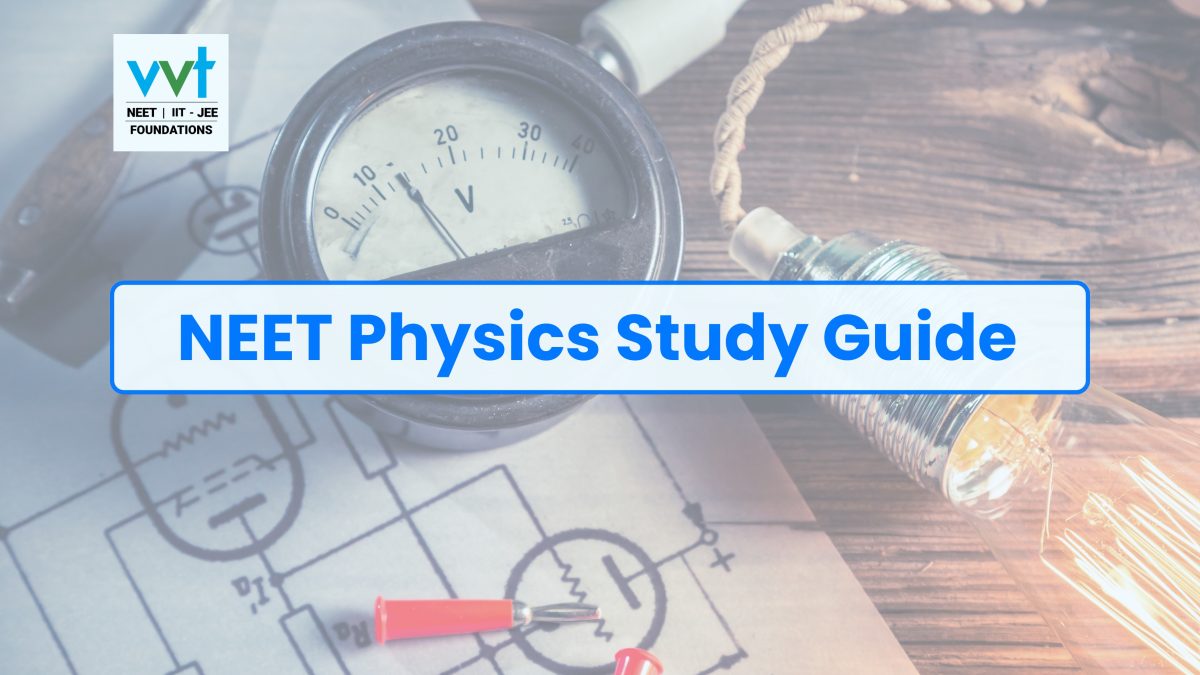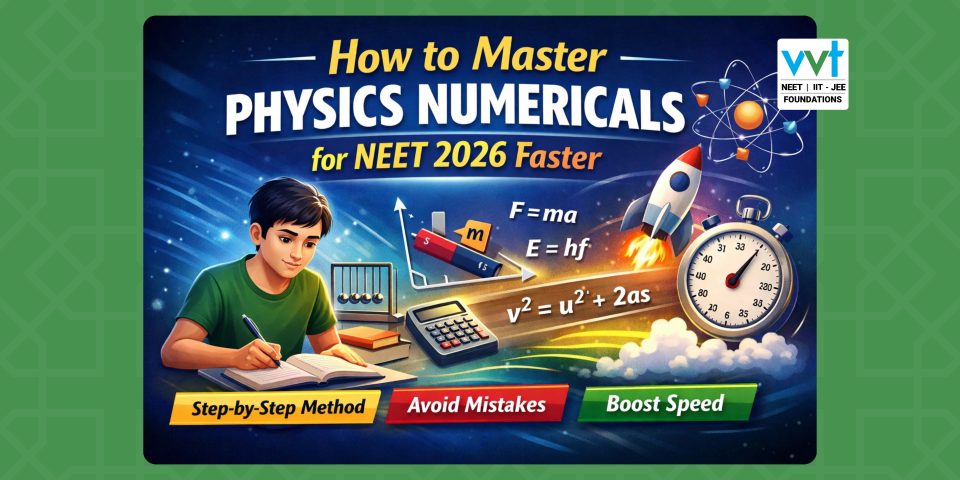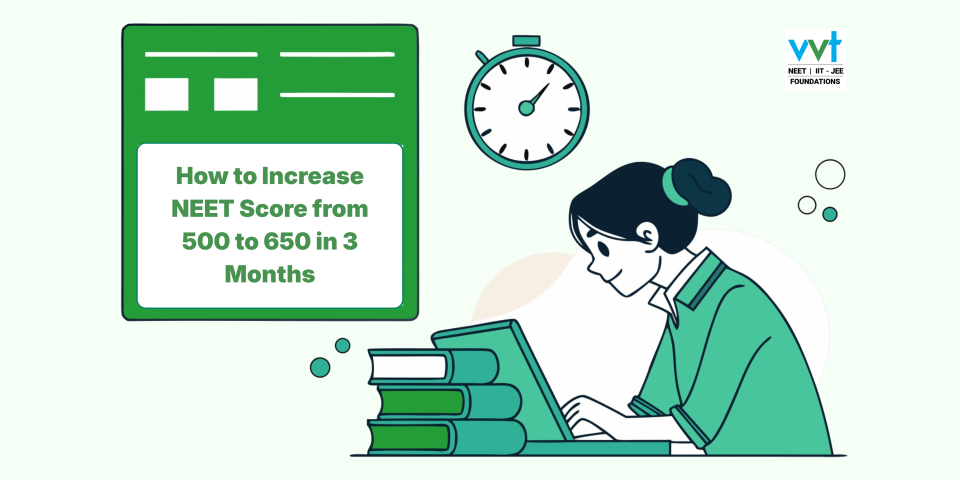
Best Books for NEET 2026 Preparation: Your Ultimate Guide by VVT Coaching
July 22, 2025
NEET Preparation Tips for Droppers
July 24, 2025How to Study Physics for NEET: A Comprehensive Guide by VVT Coaching
VVT Coaching Chennai – Ranked #1 Best NEET Coaching Centre by Times Now!
The National Eligibility cum Entrance Test (NEET) is a highly competitive exam for aspiring medical students in India. Among its three sections Physics, Chemistry, and Biology ,Physics is often perceived as the most daunting due to its conceptual complexity and numerical problem-solving requirements. However, mastering Physics is crucial for achieving a high rank, as it contributes 180 marks out of the total 720.
This comprehensive guide, brought to you by VVT Coaching, outlines a step-by-step strategy to excel in NEET Physics, along with tips, resources, and insights to boost your preparation. With our expert guidance, you can transform Physics from a challenge into a strength.
Understanding NEET Physics
Overview of the Physics Section
- Total Questions: 45
- Total Marks: 180 (out of 720)
- Syllabus: Covers Class 11 and 12 NCERT topics.
.Class 11 Topics: Mechanics, Thermodynamics, SHM, Waves
.Class 12 Topics : Electrostatics, Current Electricity, Magnetism, Optics, Modern Physics
- Question Types: Includes theoretical, numerical, and application-based questions, ranging from easy to difficult.
Why Physics is Critical
Physics is a rank-decider in NEET because many students underperform in this section, focusing more on Biology and Chemistry. Scoring well in Physics (140+ marks) can set you apart and improve your chances of securing admission to prestigious medical colleges. According to experts, a score above 650 overall often requires a strong performance in Physics.
Common Challenges
Students often face the following hurdles:
- Lack of conceptual understanding
- Difficulty solving numerical problems
- Time management during the exam
- Negative marking (1 mark deducted per incorrect answer)
Step-by-Step Guide to Prepare for NEET Physics
To help you succeed, we’ve outlined a six-step strategy based on insights from top educational platforms like Byju’s and Vedantu, tailored with VVT Coaching’s expertise.
1. Choose the Right Study Materials
Selecting the right resources is the foundation of effective preparation.
- NCERT Textbooks (Class 11 and 12): These are non-negotiable. Thoroughly study all concepts, examples, and exercises, as many NEET questions are directly based on NCERT.
- Reference Books:
- Concepts of Physics by H.C. Verma: Ideal for building conceptual clarity.
- Objective Physics by D.C. Pandey: Great for practice questions.
- Fundamentals of Physics by Halliday, Resnick, and Walker: Useful for advanced understanding.
- Problems in General Physics by I.E. Irodov: Recommended for challenging numericals (advanced learners).
2. Develop a Study Strategy
A well-planned approach ensures efficient preparation.
- Prioritize High-Weightage Topics: Focus on chapters with higher question frequency based on previous years’ trends. Here’s a breakdown:
| Topic | Approx. Weightage (Questions) |
| Mechanics | 11-13 |
| Heat & Thermodynamics | 3-4 |
| Waves & Oscillations | 2-3 |
| Magnetism & & EMI | 4-6 |
| Modern Physics | 6-7 |
| Current Electricity | 5-6 |
| Optics | 4-5 |
- Time Allocation: Dedicate more time to high-weightage topics like Mechanics and Electricity while ensuring all chapters are covered. For example, allocate 40% of your Physics study time to Mechanics and Electricity, 30% to Modern Physics and Magnetism, and 30% to other topics.
- Study Schedule: Create a weekly plan, such as 2-3 hours daily for Physics, including theory and practice.
3. Focus on Conceptual Clarity
Physics demands understanding over memorization.
- Understand Concepts First: Study the theory behind each topic before attempting questions. For example, in Mechanics, grasp concepts like Newton’s Laws before solving problems.
- Use Visual Aids: Diagrams, flowcharts, and real-life examples can simplify complex topics like Optics or Electrodynamics.
- Clear Doubts Promptly: Use resources like VVT Coaching’s doubt-clearing sessions or online forums to resolve queries.
4. Practice Regularly
Consistent practice is key to mastering Physics.
- Previous Years’ Question Papers: Solve NEET papers from the last 5-10 years to understand question patterns and difficulty levels.
- Mock Tests: Attempt regular mock tests to simulate exam conditions and improve speed and accuracy. VVT Coaching offers tailored test series.
- Numerical Practice: Solve 150-200 questions daily, focusing on numericals, as they form a significant portion of the Physics section.
5. Take Notes
Effective note-taking enhances retention and revision.
- Create Concise Notes: Summarize key formulas, concepts, and derivations for each of the 29 NEET Physics chapters.
- Quick Revision Sheets: Maintain a separate sheet for important formulas and concepts for last-minute revision.
- Organize by Topic: For example, group all Mechanics formulas together for easy access.
6. Master Time Management
Efficient time management is crucial during preparation and the exam.
- During Preparation: Practice solving 45 questions within 105 minutes (the approximate time for Physics in NEET).
- During the Exam: Start with questions you’re confident about to secure marks quickly. Avoid spending more than 2-3 minutes on a single question.
- Prioritize Accuracy: Due to negative marking, ensure you’re confident before answering.
Additional Tips and Tricks
- Handling Difficult Topics: Break complex topics like Thermodynamics or Electrodynamics into smaller parts and study them systematically.
- Regular Revision: Allocate weekly time to revise all topics, focusing on weaker areas.
- Stay Motivated: Set small, achievable goals (e.g., mastering one chapter per week) and reward yourself for progress.
- Healthy Routine: Maintain a balanced diet, exercise, and get 6-8 hours of sleep to stay focused and energized.
Why Choose VVT Coaching?
At VVT Coaching, we are committed to helping you excel in NEET Physics with:
- Experienced Faculty: Our teachers have in-depth knowledge of NEET Physics and proven teaching methods.
- Comprehensive Study Materials: Access curated notes, formula sheets, and topic-wise practice questions.
- Regular Mock Tests: Simulate exam conditions to track progress and improve performance.
- Personalized Doubt-Clearing Sessions: Get one-on-one support to resolve queries.
- Motivational Guidance: Stay on track with regular counseling and goal-setting sessions.
Join VVT Coaching to transform your NEET Physics preparation and achieve your dream score. Contact us at +91 8122122333 for more information.
Conclusion
Mastering Physics for NEET requires a strategic approach, consistent practice, and a focus on conceptual clarity. By following this guide, choosing the right study materials, prioritizing high-weightage topics, practicing regularly, and managing time effectively, you can overcome the challenges of NEET Physics and achieve a top rank.
VVT Coaching is here to support you with expert faculty, comprehensive resources, and personalized guidance. Take the first step towards your medical career by joining VVT Coaching today!
FAQs
1. What is the best book for NEET Physics?
NCERT textbooks are essential, as most NEET questions are based on them. For additional practice, Concepts of Physics by H.C. Verma and Objective Physics by D.C. Pandey is highly recommended.
2. How many hours should I study Physics daily for NEET?
Aim for 2-3 hours of focused study daily, plus 1-2 hours of practice to build confidence and accuracy.
3. Is it necessary to solve all numerical problems?
While solving every problem isn’t feasible, practice a variety of problems from each topic to ensure a strong foundation.
4. How can I improve my speed in solving Physics questions?
Regularly attempt mock tests and time yourself while solving previous years’ papers. VVT Coaching’s test series can help you practice under exam-like conditions.
5. What is a good score in NEET Physics?
A score of 140-155 is considered good. To excel, aim for 160+ by answering at least 40 out of 45 questions correctly.











